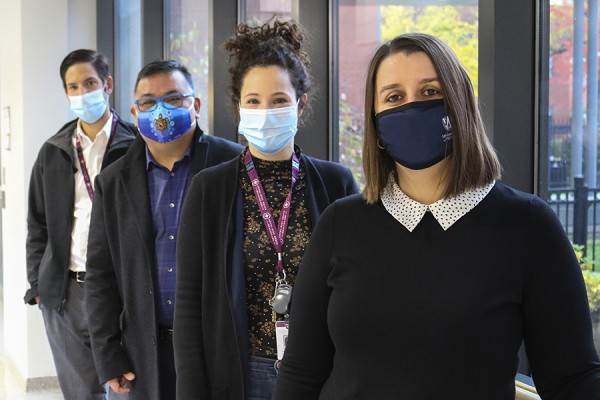 Mike McKay, executive director of the Great Lake Institute for Environmental Research, is leading a research team using sewage as an early warning system to determine trends in COVID-19 infection rates.
Mike McKay, executive director of the Great Lake Institute for Environmental Research, is leading a research team using sewage as an early warning system to determine trends in COVID-19 infection rates.
A team of UWindsor scientists testing sewage as an early warning system for the community spread of COVID-19 has received a huge federal funding boost.
Navdeep Bains, Minister of Innovation, Science and Industry, Thursday announced $300,000 in funding to the team led by UWindsor’s Mike McKay. The money comes from the Canada Foundation for Innovation (CFI) which is directing a special fund of $28 million for equipment needed for research related to COVID-19. Dr. McKay’s project, in conjunction with fellow UWindsor researchers Daniel Heath, Lisa Porter, Rajesh Seth, and Christopher Weisener, is one of 79 across the country to receive money from the fund.
“The investment from CFI builds capacity in our surveillance program that will position us to more quickly inform public health units on community infections revealed from wastewater,” said McKay, executive director of the Great Lakes Institute for Environmental Research. “The infrastructure supported by this award will also be an important element to advance screening efforts on campus to facilitate an eventual return to face-to-face instruction at UWindsor.”
The virus responsible for COVID-19 is shed in fecal matter. Early into the pandemic, McKay recognized you can determine trends in the infection rates in a given community by detecting the presence of the virus’s genetic signature in the sewage entering wastewater treatment plants.
“An alternative to testing individuals lies literally beneath our feet in our municipal sewer systems,” McKay explained. “A 24-hour composite sample of raw sewage represents the fecal discharge of the entire community served by the plant, effectively providing a community-wide swab.”
Staff at sewage treatment plants regularly collect samples of wastewater entering and leaving their facilities as part of regulatory compliance and process testing. McKay’s team is gathering those samples from plants in Windsor, Lakeshore, Amherstburg, and London and analyzing them for the presence of the virus’s RNA.
He is also working with scientists across Ontario coordinated through the Canadian Water Network’s COVID-19 Wastewater Coalition doing similar research.
McKay called the testing a “robust tool” epidemiologists could use to track community health in future pandemics beyond COVID-19.
Thursday’s funding announcement stressed how scientific research like that being carried out at UWindsor can be used to inform decision making during the pandemic, said K.W. Michael Siu, UWindsor’s vice-president, research and innovation.
The research infrastructure funded by CFI will significantly extend the University’s capacity to detect and track the presence of COVID-19 in the Windsor-Essex community,” said Dr. Siu. “Sewage testing may serve as the canary in the coal mine for the COVID-19 pandemic.”
An environmental microbiologist who specializes in algal blooms, McKay pivoted with his team to COVID-research when the pandemic struck.
“Canadian researchers’ immediate response to the pandemic has demonstrated the research community’s crucial role in helping to resolve this crisis,” said Roseann O’Reilly Runte, CFI president and CEO.
“The CFI is proud to support their efforts by equipping them with the research infrastructure they need to further their significant work.”
—Sarah Sacheli






